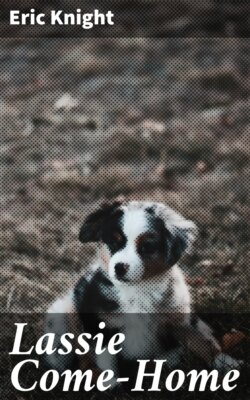Читать книгу Lassie Come-Home - Eric Knight - Страница 3
На сайте Литреса книга снята с продажи.
Оглавление1
Table of Contents
CHAPTER ONE
Not for Sale
Table of Contents
Everyone in Greenall Bridge knew Sam Carraclough’s Lassie. In fact, you might say that she was the best-known dog in the village—and for three reasons.
First, because nearly every man in the village agreed she was the finest collie he had ever laid eyes on.
This was praise indeed, for Greenall Bridge is in the county of Yorkshire, and of all places in the world it is here that the dog is really king. In that bleak part of northern England the dog seems to thrive as it does nowhere else. The wind and the cold rains sweep over the flat moorlands, making the dogs rich-coated and as sturdy as the people who live there.
The people love dogs and are clever at raising them. You can go into any one of the hundreds of small mining villages in this largest of England’s counties, and see, walking at the heels of humbly clad workmen, dogs of such a fine breed and aristocratic bearing as to arouse the envy of wealthier dog fanciers from other parts of the world.
And Greenall Bridge was like other Yorkshire villages. Its men knew and understood and loved dogs, and there were many perfect ones that walked at men’s heels; but they all agreed that if a finer dog than Sam Carraclough’s tricolor collie had ever been bred in Greenall Bridge, then it must have been long before they were born.
But there was another reason why Lassie was so well known in the village. It was because, as the women said, “You can set your clock by her.”
That had begun many years before, when Lassie was a bright, harum-scarum yearling. One day Sam Carraclough’s boy, Joe, had come home bubbling with excitement.
“Mother! I come out of school today, and who do you think was sitting there waiting for me? Lassie! Now how do you think she knew where I was?”
“She must have picked up your scent, Joe. That’s all I can figure out.”
Whatever it was, Lassie was waiting at the school gate the next day, and the next. And the weeks and the months and the years had gone past, and it had always been the same. Women glancing through the windows of their cottages, or shopkeepers standing in the doors on High Street, would see the proud black-white-and-golden-sable dog go past on a steady trot, and would say:
“Must be five minutes to four—there goes Lassie!”
Rain or shine, the dog was always there, waiting for a boy—one of dozens who would come pelting across the concrete playground—but for the dog, the only one who mattered. Always there would be the moment of happy greeting, and then, together, the boy and the dog would go home. For four years it had always been the same.
Lassie was a well-loved figure in the daily life of the village. Almost everyone knew her. But, most of all, the people of Greenall Bridge were proud of Lassie because she stood for something that they could not have explained readily. It had something to do with their pride. And their pride had something to do with money.
Generally, when a man raised an especially fine dog, some day it would stop being a dog and instead would become something on four legs that was worth money. It was still a dog, of course, but now it was something else, too, for a rich man might hear of it, or the alert dealers or kennelmen might see it, and then they would want to buy it. While a rich man may love a dog just as truly as a poor man, and there is no difference in them in this, there is a difference between them in the way they must look at money. For the poor man sits and thinks about how much coal he will need that winter, and how many pairs of shoes will be necessary, and how much food his children ought to have to keep them sturdy—and then he will go home and say:
“Now, I had to do it, so don’t plague me! We’ll raise another dog some day, and ye’ll all love it just as much as ye did this one.”
That way, many fine dogs had gone from homes in Greenall Bridge. But not Lassie!
Why, the whole village knew that not even the Duke of Rudling had been able to buy Lassie from Sam Carraclough—the very Duke himself who lived in his great estate a mile beyond the village and who had his kennels full of fine dogs.
For three years the Duke had been trying to buy Lassie from Sam Carraclough, and Sam had merely stood his ground.
“It’s no use raising your price again, Your Lordship,” he would say. “It’s just—well, she’s not for sale for no price.”
The village knew all about that. And that was why Lassie meant so much to them. She represented some sort of pride that money had not been able to take away from them.
Yet, dogs are owned by men, and men are bludgeoned by fate. And sometimes there comes a time in a man’s life when fate has beaten him so that he must bow his head and decide that he must eat his pride so that his family may eat bread.
